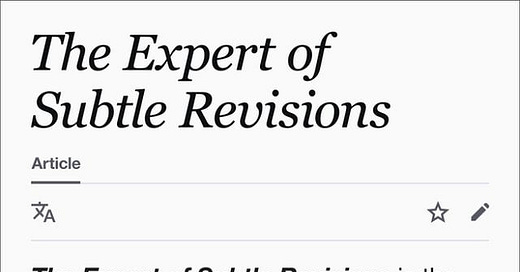From My Desk: March 2025
A genre-bending work of philosophical fiction, a deep dive into a fictional cult, and a rendezvous that goes awry
As I was looking back on these three wonderful novels publishing this month, I was struck by how apt they feel, despite being written long before the election and my having read them months ago. As a group, they all have somewhat untidy endings, leaving me with uncertainty, ambiguity, and open questions, much like the news does for me from day to day. If that doesn’t sound like what you need in March of 2025, I understand, but if you are in the mood for fiction that makes you think about big questions, I hope one of these will be right for you.
The Expert of Subtle Revisions by Kirsten Menger-Anderson (3/18/25) — As a lapsed mathematician, I’m always drawn to fiction about mathematics and its practitioners.1 The Expert of Subtle Revisions follows two storylines that intertwine in increasingly complex ways as the novel progresses. A roughly contemporary story follows Hase, a young woman whose father, a reclusive mathematician, has disappeared. The second takes place within the Vienna Circle, a group of philosophers, logicians, and mathematicians who met from 1924 to 1936 at the University of Vienna, influencing the course of 20th century philosophy. In this fictional version, a mysterious stranger joins the group and purports to have uncovered the mathematics of time travel.
Even given the premise, the way these stories connect is unexpected and deeply moving. The threads don’t unravel in the end; they twist and tighten into a knotty meditation on time, love, fate, and memory. Don’t let the mathematicians scare you away. The specifics aren’t integral2 to the plot, but the beauty and mystery of a life of theory shine through.
For: readers who like a philosophical bent to their fiction; readers of literary fiction informed by the sciences; fans of Menger-Anderson’s debut story collection, Doctor Olaf van Schuler's Brain
O Sinners! by Nicole Cuffy (3/18/25) — Nicole Cuffy’s sophomore novel3 circles around a cult (“the nameless”) in Northern California and its founder, an enigmatic Vietnam War vet who goes by Odo. I say circles around because it’s told through three storylines that offer very distinct perspectives of the nameless. The first follows Faruq, a reporter writing a story about the community who embeds with them for a few weeks, which turns into several months. The second is the transcript from a documentary made about the group’s time in Texas, where they were not warmly welcomed and a scandal forced them to relocate to California. And the third is the Vietnam experience of Odo and his company of soldiers. One of Cuffy’s elegant tricks is that he doesn’t go by Odo at that time, so we don’t know which member of the unit will become the founder until the very end.
When I talk to booksellers about this book, there are a certain number of them who don’t need to hear anything else after the word “cult”. Cults are inherently fascinating and reading about them always brings up questions: What draws people into these communities? What keeps them? Would I be vulnerable? (The answer for all of us, I suspect, is probably.) What would bring someone to start one? What I loved about O Sinners! is that Cuffy grapples with all these questions, but doesn’t claim to have any answers. There are no big reveals, no tidy origin stories. Just a collection of people trying to find and make meaning, understand life and death, create community, and make choices for themselves and those around them. The line between good-faith and bad-faith is blurry, as it so often is.
For: anyone intrigued by the inner workings of cults; readers of fiction that plays with perspective
Lucky Night by Eliza Kennedy (3/25/25) — Lucky Night is a novel that might make you anxious. Its main (only) characters are Nick and Jenny, a couple that has been having an affair for six years, and is finally spending their first full night together, in a brand-new, high-rise luxury hotel. At some point during their evening, a fire breaks out on a floor below and they are trapped until help arrives. With the mood killed and nowhere to go, the two start hashing out all the conversations they’ve avoided over the years: what exactly they’re doing, what they hope for this relationship and for their marriages, what they think of one another’s careers, if this is still working, and if it ever did.
Bouncing back and forth between their perspectives, we see how Jenny and Nick understand and misunderstand each other, where the tensions and the potentials lie. As the threat of the fire simmers in the background, a sense of unease grows more and more insistent, ratcheting up the stakes of their conversations and the weight of their dreams for the future. I loved following their unlucky night, but I’ll admit that I read it the weekend before the 2024 election. I couldn’t have read it the weekend after. I could today, but only in a certain mood.
For: readers interested in small-scale novels with a deep sense of interiority; readers who love a juicy relationship drama; fans of Amy Adams (her production company is adapting the novel for the stage, and just the thought sounds perfect)
The word “lapsed” might be the key in that sentence. I retain a deep interest in mathematics, but I’m not sure I still remember enough to nitpick over the details in a fictional representation.
No pun intended, I swear.







